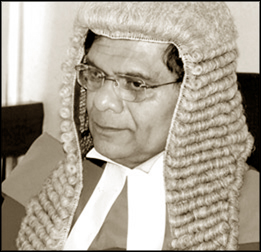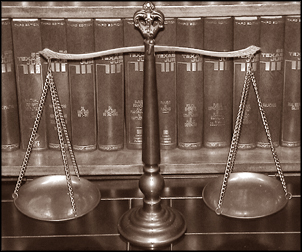|
Final Court of Justice in Sri Lanka:
Supreme Court as the highest Court of Justice
by Sarath WIJESINGHE
The Supreme Court of Sri Lanka was created in 1972, after the
adoption of a new Constitution, replacing the Constitution Adopted on
severing connections with the British Empire. The Sri Lankan judicial
system is complex and is a blend of both Common Law and Civil Law.
 |
|
Chief Justice Asoka de
Silva |
It is the highest Court in the country. It is the highest and final
superior Court of record in the Republic and shall address matters in
respect of the constitution, fundamental rights, consultative
jurisdiction, election petitions and other matters which the Parliament
may by law vest in it and it is the final Court of appellate and
original jurisdiction.
Today the Constitution of the Democratic Socialist Republic of Sri
Lanka is in force certified on August 31, 1978. It is a mixture of
mainly British Parliamentary and EU Presidential democratic models which
has brought about political stability in the country despite lot of
criticism.
Justice is a concept of moral righteousness based on ethics,
rationality, law, natural law, religion, fairness and/or equity and is a
human creation based on equity without which the Nation is doomed to be
subjected to the Law of the Jungle and the survival of the fittest.
Equity is a name given to a set of legal principles which supplements
the strict rule of law the principles of which ended the arbitrary
exercise of conscience.
“Reception Statute” is the principle adopted for the tacit and direct
implementation of the British Principles and Practices that are adopted
in the Commonwealth jurisdictions including Sri Lanka, via legislative
bodies, Constitutions and judges and made law. Judges of those who are
human too are liable to make mistakes in addition to cruel judges and
checks and balances should be available for the safety of the citizen
from Judges who are not human cruel and arbitrary.
They possess different sentiments and attitudes and approaches
towards the society. There are checks and balances in other
jurisdictions though in Sri Lanka it is self regularity in view of the
enormous freedom given to the Judiciary for the “Independence” and
powers vested since the year 1800 where powers are concentrated in the
Supreme Court on the administration of Justice and Legal Education.
Currently the citizen is at ease contended and feel safe in the hands
of the current Head of the Judiciary. The Chief Justice of Sri Lanka,
who has at the outset declared he will serve the nation based on great
concepts of Justice and fair play which he described in a stanza in
Dhammapada which quoted as follows:
“Not by passing arbitrary judgements does a man becomes, a wise man
is he who investigates both right and wrong. He who does not judge
others arbitrarily according to the truth, that sagacious man is a
guardian of law and is called just. One is not wise because one speaks
much.
He who is peaceful, friendly and fearless is called wise. A man is
not versed in Dhamma because he speaks much. He who, after hearing a
little Dhamma, realizes its truth directly and is not heedless of it is
truly versed in Dhamma. One is called noble because he is harmless
towards all living beings” The Just - Dhammapada.
The Chief Justice is quite correct and it is timely in quoting this
noble stanza at this crucial hour when the Nation is in the main cross
road in the annuls of our history. Why the Lordships choose to quote
this at this juncture too is a matter which is important to note. In a
small country such as ours where the citizens are known to each other in
some way there should be more and more checks and balances, as
religious, political and ethnic considerations are bound to play a role
in decision making.
 |
|
Scales of justice |
Quotation of this stanza at this juncture speaks volumes on the
contents and applicability to the society depends on a “just and
democratic society from the Executive and “justice” from the guardians
of justice. Today the nation is in safe hands with the current Head of
the Judiciary who has pledged to follow these great concept and
practices blended with the currently followed great western values and
jurisprudence coupled with principles of justice, equality and equity,
but the moot issue today is the finality of judgements in the Supreme
Court which states that it has the final appellate jurisdiction. It has
original jurisdiction as well as the appellate and the finality is
discussed only in the case of appellate jurisdiction. The Supreme Court
prepares its own rules from time which is changed by the Court at will,
which determines the procedure and guide lines of the conduct of the
Supreme Court. Therefore the finality is a matter of interpretation of
the Supreme Court alone which has “Inherent Powers” by which any steps
could be taken in the interest of justice, which is not questionable by
any other institution including the Executive and the international
Courts as access to international Courts have been prevented by judge
made law, though it is what is expected by international law and
conventions. We are in a “minefield and maize” in this moot issues for
which the answer lies in the Supreme Court alone, where the
interpretation on the finality by the Supreme Court is acceptable and
changeable.
Judge made law and statute law
There is judge made law based on the precedents of previous
judgements which is flexible by subsequent judgments of the highest
court which are binding on other courts.
Justice Amarasinghe found that “when the Supreme Court has decided a
matter, the matter is at an end” Justice Mark Fernando said, “It is a
well established rule that a court cannot rehear, review judgement once
delivered”.
Nevertheless the Supreme Court has recognised/identified exceptions
to the general rule, which are orders have not attained finality,
Clerical mistakes, Parties made wrongfully, orders given on wrong facts
given on prejudice on laid down that the attainment of justice as the
guiding factor.
A former CJ Parinda Ranasingh’s minority decision during the era
where dissenting judgements were more frequent is important which states
as follows.”
On considering of the foregoing, I am of the opinion that this court
has inherent jurisdiction to grant, in appropriate circumstances, relief
against or in respect of even previous judgements of this court in order
to “do justice”. This is a far reaching minority judgement which is
forceful by itself, though not the majority. It is also a moot issue
whether the majority decision is always correct which is subject to
correction by subsequent decisions. The other moot issue is whether we
should prevent and curtail litigation or take precautions to prevent
miscarriage of justice and to find remedies if and when the citizen has
lost everything including basic justice he is morally and legally
entitled to.
Law, equality and equity
Law and equality is an ancient principle and accident of history at
the end of 13th century courts of law gradually “froze” procedure and
hearing of petitions followed. In 1253, power to issue writs were
granted to courts as “writ for right” principles of which we too follow
today in Sri Lanka. People started petitioning and Chief Justice Edward
Cooke started issuing Habeas Corpus writs.
We follow the principles and practices of Administrative law in the
United Kingdom which plays a main role in the application of the
principles of fundamental rights and the applicability of fundamental
rights and the applicability which are enshrined in Article 14 and 126
respectively.
Judgement is a formal decision made by a court following a law suit.
In the United States final court is the Federal Court where all the
matters are taken into consideration carefully. It is extremely careful
in exercising original jurisdiction, as the final decision can be
changed only under very exceptional circumstances.
In the United Kingdom where we inherited our system of law the
finality is flexible where the matters could be canvassed in the Privy
Council and the Supreme court, especially and mainly on miscarriage of
justice where the decisions were often overturned on this as there is no
floodgate of cases as the system carefully identifies matters of public
importance and justice is needed to the citizen aggrieved.
The thinking and the attitude behind the System is the UK West and
USA, is that the citizen should not be penalised for the mistakes by
judges especially when the original jurisdictions are exercised.
There were instances when judgements were delivered in few minutes
with no proper or a heating at all denying the citizen of a fair trial
and appeal which decides their entire future property and the family.
Justice is a human creation
Justice is a human creation though statutory or judge made. The
underlying feature is Justice to the Human who depends on the judiciary
who exercise the power temporarily for the carriage of this great
responsibility towards the humanity. Judges are kind in nature,
reasonable practical and humans who love others.
Yet history has proved that cruel judges who hate the society and
those who are up to bribery, corruption and impose hasty and unruly
punishments have been in society.
In the circumstances it is the duty of the Bar and the civil society
to bring about legislation to make things fair and reasonable in the
wider sense. There could be a constitutional change to include gross
miscarriage of justice in place of Article 118 (c) to read as Supreme
Court is the final appellate jurisdiction except gross miscarriage of
justice and on exercising original jurisdiction.
It is time for the Bar Association and the legal fraternity to plead
with the Chief Justice to reconsider framing Supreme Court rules to
cater to the new needs and challenges.
This is the best opportunity for the civil society to initiate the
discussion at all levels in order to bring it to the Notice of the
Executive to make statutory changes and the Supreme Court to bring about
changes via rules and judge made law.
The writer is a Senior Solicitor in England and Wales and a Former
Secretary of the Bar Association - Chairman “For Justice and Equality”.
|

